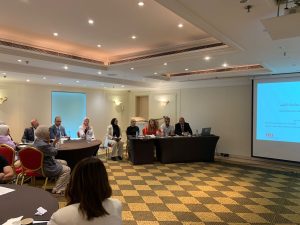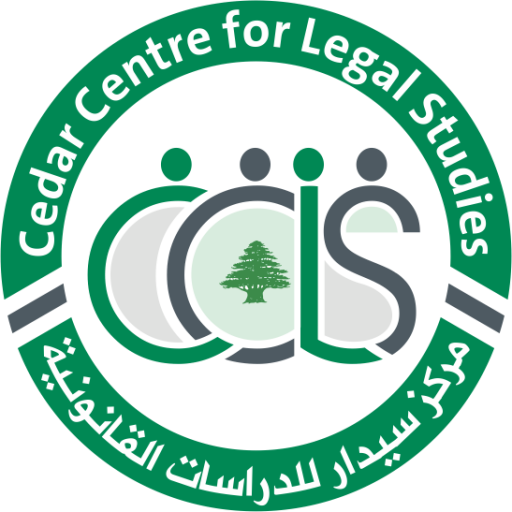Cedar Centre For Legal Studies
Activity
Cedar Centre for Legal Studies Hosts Roundtable on Refugees and Victims of Torture
28/06/2024

On 25 June 2024, the Cedar Centre for Legal Studies (CCLS) convened a significant roundtable discussion titled “Toward Access to Human Rights for Refugees and Victims of Torture” to mark the United Nations’ World Refugee Day on June 20 and the International Day for Victims of Torture on June 25. The event brought together experts, academics, judiciary members, attorneys, representative of the National Human Rights Commission, representatives of the international and national associations and refugees to highlight pressing human rights issues in Lebanon and propose actionable solutions. The event was supported by TDH (Deutschland) and Medico International.
Introduction
Attorney Samah Issa from Cedar Centre for Legal Studies opened the event, emphasizing the universality of human rights as fundamental to human dignity. She reiterated the CCLS’s commitment to upholding human rights and international law, applicable equally to all. The organization’s mission, reflected in today’s gathering, underscores the necessity of respecting human rights to foster a just and equitable society.
Keynote Speakers:

Kinga Janik, United Nations Office of the High Commissioner for Human Rights
Kinga Janik from the United Nations Office of the High Commissioner for Human Rights (OHCHR) stressed the importance of the principle of non-refoulement, which prohibits returning individuals to places where they would face torture or inhumane treatment. Ms. Janik highlighted the continued occurrence of torture in Lebanon and called for accountability for perpetrators. She also pointed out that World Refugee Day comes amid a climate of misinformation and scapegoating, making the protection of refugees more crucial than ever.
Saadeddine Shatila, Cedar Centre for Legal Studies
The executive director at CCLS Saadeddine Shatila provided an overview of the centre’s work in advancing human rights in Lebanon. The organization focuses on documenting human rights violations, including torture and forced deportations, and engages in advocacy and strategic litigation to uphold these rights. Shatila underscored the importance of collaboration with local and international organizations to achieve these goals.
Panel Discussion 1: Providing Human Rights to Refugees in Lebanon
Dr. Marie Kortam, Cedar Centre for Legal Studies
Dr. Marie Kortam, the head of Research, Policy Studies, and Implementation at CCLS, addressed the severe hardships faced by refugees in Lebanon. She called for policies that protect the rights and dignity of all individuals, highlighting the lack of a comprehensive legal framework for refugees. Kortam emphasized that forced deportations place refugees at significant risk, and any deportation strategy must avoid violating the principle of non-refoulement. This requires coordinated efforts between civil society, international organizations, and the UN.

Dr. Maja Janmyr, Prof. at University of Oslo & Issam Fares Institute (AUB)
Dr. Maja Janmyr, drawing on over a decade of research, discussed Lebanon’s role in the refugee regime and the limitations of its current legal framework. Despite not ratifying key refugee conventions, Lebanon has played an active role historically. Janmyr called for a new Memorandum of Understanding (MOU) to better regulate the relationship between Lebanon and the UNHCR, addressing the inadequacies of existing agreements.
Carole Mansour, UNRWA
Attorney Carole Mansour, Legal aid coordinator at UNRWA, presented an overview of the rights of Palestinian refugees in Lebanon, who face numerous legal and social challenges. She pointed out the absence of a legal framework to guarantee their rights, leaving many in a state of limbo. Mansour noted the additional hardships faced by Palestinian refugees from Syria, including the risk of deportation and lack of residency permits.
Voices of Refugees:
R.S: shared her experiences as a Palestinian journalist in Lebanon, calling for equal human rights and respectful treatment of refugees.
M.S: described the difficulties faced by Syrian refugees in obtaining residency and work permits, emphasizing their desire to live in dignity and peace.
A.H: recounted his decade-long struggle as an Iraqi refugee in Lebanon, highlighting the lack of support and aid from international organizations.
Panel Discussion 2: Combating Torture and Ensuring Justice

Mohamad Sablouh and the legal team, Cedar Centre for Legal Studies
Attorney Mohamad Sablouh, head of Legal Support Program at CCLS, discussed the legal and institutional challenges in addressing torture in Lebanon. He pointed out the inadequacies in implementing domestic laws against torture and the reluctance of security agencies to comply. Sablouh urged to stand up against the corruption and violations taking place in Lebanon and work to counter it.
Other cases were presented by attorneys at CCLS Hafez Bakkour, Obeida Al Samad and Tharwat Eid.
While Ms. Noor Dhyabi, Legal assistant at CCLS, explained the process of referring victims to the rehabilitation center for victims of torture in Tripoli.
At the end, the participants listened to Rabih Fadel Zakaria’s wife, who spoke about the impact of her husband’s arrest and torture on their entire family.
Dr. Ayman Trad, representative of the former Head of Tripoli Bar Association
Dr. Ayman Trad emphasized the need to amend Lebanon’s laws on torture and training for security forces. He highlighted best practices from other countries, including training and ensuring legal representation for detainees.
Conclusion
Ms. Amar Al Masri, legal assistant at CCLS, stated recommendations for a joint statement that was initiated by CCLS and TIMEP and joined by 18 local and international organizations. The signed organizations urged the Lebanese authorities to respect their international obligations and ensure that all instances of torture and ill-treatment are effectively investigated and that unlawful deportations of Syrian refugees are immediately halted.
Finally, and not lastly, Ms. Nadine Kheshen, legal associate at Tahrir Institute for Middle East Policy (TIMEP), summarized the panels discussions.
The roundtable underscored the urgent need for comprehensive legal frameworks and coordinated efforts to protect the rights of refugees and victims of torture in Lebanon. The Cedar Centre for Legal Studies remains committed to advocating for human rights and collaborating with international partners to achieve justice and dignity for all.
